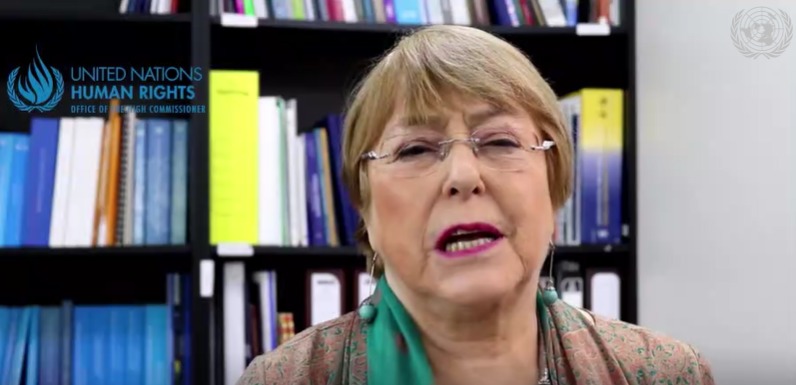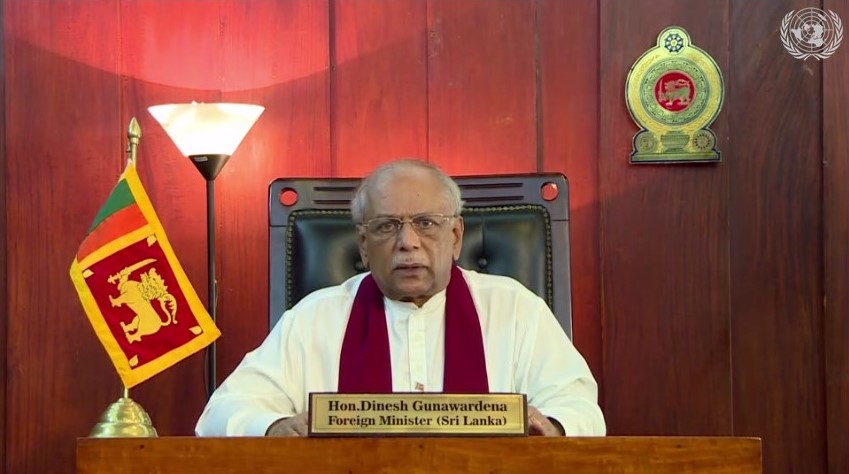
The UN human rights chief called on the UN Human Rights Council to “explore new ways to advance various types of accountability at the international level,” as she presented her report on Sri Lanka today, with Colombo reacting angrily and vowing to reject any resolution put forward.
Michelle Bachelet told the Council that, “nearly 12 years after the end of the armed conflict, domestic initiatives have repeatedly failed to ensure justice for victims and promote reconciliation”.
“The impact on thousands of survivors, from all communities, is devastating,” she continued. “Moreover, the systems, structures, policies and personnel that gave rise to such grave violations in the past remain – and have recently been reinforced.”
“Tamil and Muslim minorities are being excluded by divisive and discriminatory rhetoric including from the highest State officials.”
The UN High Commissioner for Human Rights went on to conclude,
“For these reasons, I call on the Council to explore new ways to advance various types of accountability at the international level, for all parties, and seek redress for victims, including by supporting a dedicated capacity to collect and preserve evidence and information for future accountability processes, as well as to support relevant judicial proceedings in Member States.”
See her full statement here.
#SriLanka: Long-standing, structural and systemic issues persist, and now there are clear warning signs that past patterns of violations could be repeated. – UN Human Rights Chief @mbachelet tells @UN_HRC.
— UN Human Rights (@UNHumanRights) February 24, 2021
Read more: https://t.co/IGDRAEWXgd#StandUp4HumanRights #HRC46 pic.twitter.com/BETjt22HQ4
Speaking immediately after Bachelet, Sri Lanka’s foreign minister Dinesh Gunawardena reiterated his call for member states to reject any resolution on Sri Lanka.

“Sri Lanka rejects the High Commissioner’s Report which has unjustifiably broadened its scope and mandate,” he said via video, slamming the High Commissioner’s recommendations as “preconceived, politicized and prejudicial”.
“Sri Lanka categorically rejects the conclusions and recommendations in the High Commissioner’s Report,” Gunawardena continued.
The foreign minister went on reject Bachelet’s call for “asset freezes, travel bans, references to the ICC and the exercise of universal jurisdiction by individual States” and instead warned member states that “such unilateral actions by certain countries are unacceptable and a violation of the principles of natural justice”.
“Sri Lanka calls upon the members of this Council that any resolution which is based on this Report, be rejected by the Council and be brought to a closure” he concluded.
See his full statement here.
His comments directly contradicted US Secretary of State Antony Blinken, who addressed the Council just hours earlier, calling on members to back a resolution on addressing “the lack of accountability for past atrocities in Sri Lanka”.
Canada’s Foreign Minister, H.E. Mr Marc Garneau, also expressed “deep concern” about the deteriorating human rights situation in Sri Lanka and emphasised the need to hold Sri Lanka accountable for crimes committed.
The session will resume tomorrow morning with comments from other member states and non-governmental organisations.
A draft of a potential resolution on accountability in Sri Lanka was released last week, calling on the Office of the High Commissioner for Human Rights “to consolidate, analyse and preserve” evidence that could be used in future war crimes trials and called for enhanced “monitoring and reporting on the human rights situation in Sri Lanka”.
However, many Tamil activists expressed disappointment at the draft, with many lobbying for the mandate of a stronger international accountability mechanism that will finally see perpetrators of mass atrocities brought to justice. It has been almost 12 years since tens of thousands of Tamil civilians were killed in a military offensive by the Sri Lankan state, which saw hospitals bombed, widespread sexual violence and executions of those attempting to surrender. Many of those that led the offensive remain in senior positions, including Sri Lanka's president, prime minister, army chief and defence secretary.
